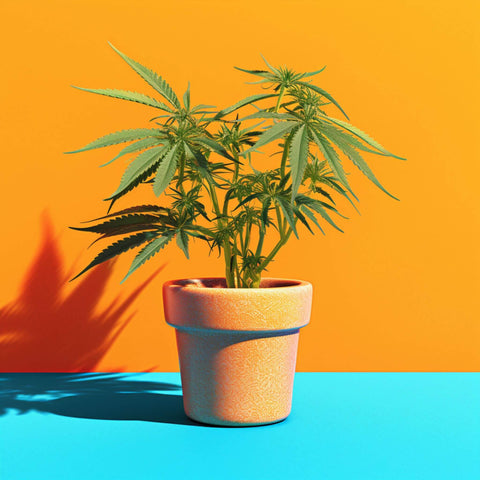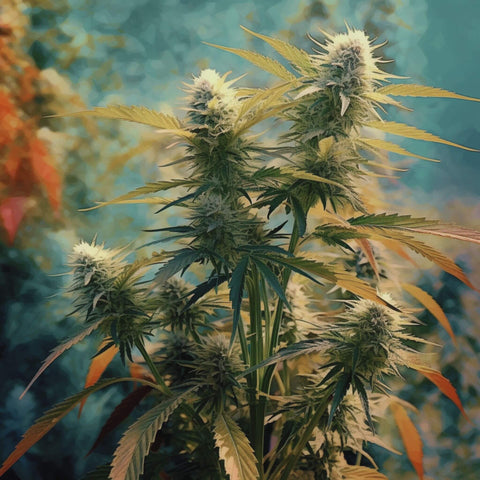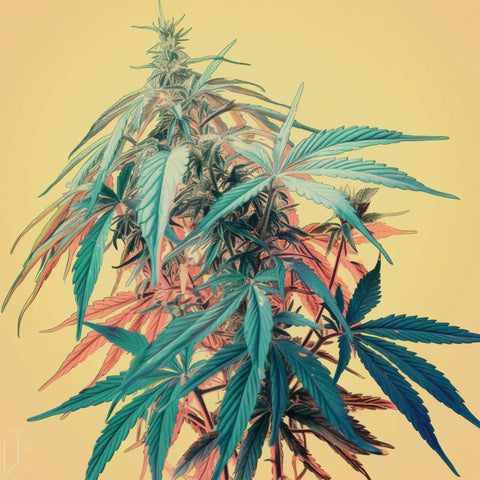Decoding Ganja: History, Culture, and Future Trends

Welcome to our exploration of the rich history and cultural significance of 'Ganja'. This term, steeped in centuries of tradition, has a fascinating origin story and a profound impact on various cultures worldwide.
'Ganja' is a term that has been used for centuries to refer to a specific product of the cannabis plant. The word itself is derived from ancient languages, but its meaning has evolved and expanded over time, taking on cultural and social nuances that extend beyond its original definition.
Definition and Meaning of Ganja
In its most basic sense, 'Ganja' refers to the buds or flowers of the cannabis plant. These are typically the most potent parts of the plant in terms of psychoactive properties, as they contain the highest concentration of THC (tetrahydrocannabinol), the chemical responsible for most of cannabis's psychological effects.
However, 'Ganja' is more than just a botanical term. It carries cultural and historical weight, particularly in regions like India and Jamaica, where it has been used in religious and spiritual practices. In the context of Rastafarianism, for instance, 'Ganja' is seen as a sacrament that aids in meditation and spiritual insight.
Differences Between Ganja and Other Terms for Cannabis
While 'Ganja' is often used interchangeably with other terms for cannabis, such as marijuana or weed, there are subtle differences in connotation and usage. 'Marijuana', for example, is a term of Spanish origin that became popular in the United States in the early 20th century. It is often associated with the recreational use of cannabis, particularly in the context of the prohibition and legalization debates.
On the other hand, 'Ganja' carries a more spiritual and cultural connotation, particularly concerning Rastafarian and Indian traditions. It is often associated with the plant's natural and unprocessed state, reflecting a more holistic and traditional view of cannabis use.
The Origin and Spread of Ganja

The journey of 'Ganja' as a term and a cultural phenomenon is a fascinating tale that spans continents and cultures. From its ancient roots in the Indian subcontinent to its widespread use in modern societies, 'Ganja' has a rich and varied history.
The Sanskrit Roots of the Term Ganja
The term 'Ganja' originates from the Sanskrit word 'gañjā', which refers to a specific preparation of the cannabis plant. This term was adopted into Hindi and Urdu, widely spoken in the Indian subcontinent. In these languages, 'Ganja' came to refer to the potent buds of the cannabis plant, which were often used in traditional medicines and religious rituals.
Spread of Ganja from India to Jamaica and Beyond
The term 'Ganja' came to the Western world through cultural exchanges and migrations. During the 19th century, many Indians were brought to Jamaica as indentured labourers. They brought with them their language, culture, and practices, including the use of 'Ganja'. Over time, the local population adopted the term, particularly within the Rastafarian community, where 'Ganja' took on a spiritual significance.
From Jamaica, the term spread to other parts of the world, carried by the global popularity of Reggae music and the Rastafarian movement. Today, 'Ganja' is recognized and used globally, not only as a term for cannabis but also as a symbol of counterculture, resistance, and spiritual exploration.
Ganja and Rastafarianism
The relationship between 'Ganja' and Rastafarianism is deeply intertwined, with the plant playing a significant role in this movement's spiritual and cultural practices.
The Role of Ganja in Rastafarian Culture and Practices
In Rastafarianism, 'Ganja' is a sacrament facilitating communication with the divine. It is used in religious ceremonies, often called 'reasoning sessions', where Rastafarians gather to debate ethical and spiritual matters. During these sessions, 'Ganja' is smoked ritualistically, with prayers and blessings often preceding its use. The belief is that 'Ganja' aids in attaining wisdom, clarity, and spiritual insight, fostering a deeper connection with the divine.
The Association of Ganja with Reggae Music
'Ganja' also strongly associates with Reggae music, a genre that emerged from Jamaica in the late 1960s. Many Reggae artists, including the legendary Bob Marley, were devout Rastafarians and often incorporated references to 'Ganja' in their lyrics. For them, 'Ganja' was not just a substance but a symbol of resistance against oppression and a tool for spiritual exploration. Through their music, they spread the Rastafarian philosophy and the cultural significance of 'Ganja' to a global audience, further cementing its place in popular culture.
The Modern Use of Ganja

In today's world, 'Ganja' has transcended its traditional uses and has found a place in various aspects of modern society. Its use is no longer confined to spiritual rituals or countercultural movements but has permeated mainstream culture in many ways.
How Ganja is Used in Contemporary Society
In contemporary society, 'Ganja' is used for various purposes. For some, it continues to be a spiritual aid used in meditation and religious practices. For others, it's a form of alternative medicine believed to alleviate symptoms of various health conditions, including chronic pain, anxiety, and insomnia.
'Ganja' has also found a place in recreational use, with many people using it for its psychoactive effects. It has influenced music, art, and literature and even entered the culinary world, with 'Ganja'-infused foods and beverages becoming increasingly popular.
The Legal Status of Ganja in Different Countries
The legal status of 'Ganja' varies greatly from country to country. In some places, like Canada and certain states in the U.S., 'Ganja' is fully legal for medical and recreational use. In others like the Netherlands, it's decriminalized and regulated through licensed cafes.
However, in many parts of the world, 'Ganja' remains illegal, with penalties ranging from fines to imprisonment. These differing legal statuses reflect the ongoing global debate about 'Ganja', its potential benefits, and its societal impact.
Ganja and Medical Use
The potential medical benefits of 'Ganja' have been a topic of interest for many years. As research continues to evolve, so does our understanding of how 'Ganja' can be used in a medical context.
Medical Uses of Ganja
'Ganja' has been used in traditional medicine for centuries, but it's only in recent decades that scientific research has begun to explore its potential therapeutic benefits. Today, 'Ganja' is used to treat a variety of conditions. It's often prescribed for chronic pain, a common ailment affecting millions worldwide. The cannabinoids in 'Ganja' interact with the body's endocannabinoid system, which plays a role in pain regulation.
'Ganja' also alleviates nausea and vomiting in cancer patients undergoing chemotherapy. Additionally, it's used to treat symptoms of neurological conditions like multiple sclerosis and epilepsy. Some research suggests that 'Ganja' may help with mental health conditions like anxiety and post-traumatic stress disorder (PTSD), though more research is needed in this area.
Ongoing Research and Debates about the Medicinal Benefits of Ganja
While evidence supports the medical use of 'Ganja', it's a topic of ongoing debate. Critics argue that the risks, such as potential addiction and mental health issues, may outweigh the benefits. They also point out that many of the studies on 'Ganja' are based on self-reported data, which can be unreliable.
On the other hand, proponents argue that 'Ganja' is a natural and effective treatment for many conditions and that it's a safer alternative to opioids for pain management. They advocate for more research to fully understand the potential of 'Ganja' as a therapeutic tool.
Ganja and Spirituality

The use of 'Ganja' in spiritual practices is a tradition that spans centuries and cultures. From ancient rituals to modern meditation practices, 'Ganja' has often been seen as a tool for spiritual exploration and enlightenment.
Spiritual Aspects of Ganja Use in Different Cultures
In many cultures, 'Ganja' is a sacred plant in religious ceremonies and spiritual rituals. It has been used in religious practices in India for centuries, particularly in worshipping the Hindu deity Shiva. During the festival of Holi, 'Ganja' is often consumed as a drink called 'bhang' as part of the celebrations.
In Rastafarianism, a spiritual movement that originated in Jamaica, 'Ganja' is seen as a sacrament that aids in communication with the divine. It's used in 'reasoning sessions', where Rastafarians gather to debate ethical and spiritual matters, with the belief that 'Ganja' aids in the attainment of wisdom and insight.
Role of Ganja in Meditation and Spiritual Practices
Beyond its use in specific religious contexts, 'Ganja' is also used in broader spiritual practices, particularly meditation. Some people find that 'Ganja' helps to quiet the mind, making it easier to enter a meditative state. It's believed to enhance introspection and self-awareness, qualities that are central to many spiritual practices.
However, the use of 'Ganja' in meditation and spirituality is not without controversy. Some argue that true spiritual growth must come from within and that using substances like 'Ganja' can be a crutch or a distraction. Despite these debates, the use of 'Ganja' in spiritual practices is a significant aspect of its cultural and historical legacy.
The Benefits and Disadvantages of Ganja
The use of 'Ganja', like any substance, comes with its potential benefits and risks. It's important to understand these to make informed decisions about its use.
Potential Health Benefits of Ganja
'Ganja' has been used for medicinal purposes for centuries, and modern research has begun to validate some of these traditional uses. It's often used to manage chronic pain, as the cannabinoids in 'Ganja' interact with the body's endocannabinoid system, which plays a role in pain regulation.
'Ganja' is also used to alleviate nausea and vomiting in cancer patients undergoing chemotherapy and to treat symptoms of neurological conditions like multiple sclerosis and epilepsy. Some research suggests that 'Ganja' may help with mental health conditions like anxiety and post-traumatic stress disorder (PTSD), though more research is needed in this area.
Potential Risks and Disadvantages Associated with Ganja Use
While 'Ganja' has potential therapeutic benefits, it's not without risks. One of the main concerns is the potential for dependency. While 'Ganja' is less addictive than some substances, such as alcohol or nicotine, some people may develop a psychological dependence on it.
'Ganja' can also have short-term effects such as impaired memory, altered judgment, and coordination issues, leading to accidents or injuries. Long-term use can lead to cognitive impairment, particularly in those who use 'Ganja' at a young age.
Furthermore, 'Ganja' can have negative effects on mental health. Some studies suggest it can exacerbate symptoms in individuals with pre-existing mental health conditions, such as schizophrenia.
Ganja and Legislation
The legal status of 'Ganja' varies greatly worldwide, reflecting the diverse attitudes and policies towards this plant. From strict prohibition to full legalization, the laws surrounding 'Ganja' are as varied as the countries implementing them.
Laws Surrounding Ganja in Australia and Different Countries
In Australia, the laws surrounding 'Ganja' are complex and vary by state and territory. While medicinal cannabis has been legalized nationally, recreational use is still largely illegal. However, in the Australian Capital Territory (ACT), adults can possess up to 50 grams of 'Ganja' and grow two plants for personal use.
In contrast, countries like Canada and Uruguay have legalized 'Ganja' for medical and recreational use. In the United States, laws vary by state, with some allowing recreational use, others only allowing medicinal use, and some prohibiting it entirely.
In many parts of the world, however, 'Ganja' remains strictly illegal, with penalties ranging from fines to imprisonment.
Impact of Legalization/Decriminalization of Ganja in Certain Regions
The legalization or decriminalization of 'Ganja' can have significant impacts on a region. On the one hand, it can lead to increased tax revenue and job creation. In the United States, states that have legalized 'Ganja' have seen significant economic benefits.
Legalization can also have social justice implications, as it can lead to fewer arrests for 'Ganja' possession, which disproportionately affects marginalized communities.
However, legalization can also lead to public health concerns, such as increased adolescent use and traffic accidents due to impaired driving.
The Future of Ganja

As we look towards the future, the landscape of 'Ganja' use, legislation, and research is poised for significant change. From evolving social attitudes to groundbreaking scientific discoveries, the future of 'Ganja' is a topic of great interest and potential.
Potential Future Trends of Ganja Use, Legislation, and Research
In terms of use, we're likely to see 'Ganja' become more mainstream as societal attitudes shift. This could lead to increased use for both medicinal and recreational purposes and potentially the development of new products and methods of consumption.
Legislation is also likely to evolve. As more research is conducted and the potential benefits of 'Ganja' become more widely recognized, we may see more countries moving towards decriminalization or legalization.
In the realm of research, the future is particularly exciting. As the stigma around 'Ganja' decreases, scientists are gaining more freedom to explore its potential benefits and risks.
Potential Impact of These Trends on Society and Culture
These trends could have profound impacts on society and culture. The normalization of 'Ganja' could lead to changes in social norms and attitudes, influencing everything from music and art to politics and religion.
The economic impact could also be significant, with the potential for job creation, increased tax revenue, and the growth of new industries.
However, these changes could also bring challenges, such as the need for regulation, public health concerns, and the potential for increased substance abuse.
Conclusion
As we conclude our exploration of the rich history and cultural significance of 'Ganja', it's clear that this plant, with its deep historical roots and varied cultural significance, continues to play a pivotal role in contemporary society.
We've traced the journey of 'Ganja' from its origins in the ancient languages of the Indian subcontinent to its widespread use in modern societies. We've explored its spiritual significance in Rastafarianism and its influence on Reggae music. We've delved into its modern uses, from recreational to medicinal, and examined the ongoing debates surrounding its potential benefits and risks.
Looking ahead, the future of 'Ganja' is poised for transformation. From potential changes in legislation to advancements in research, 'Ganja' is likely to continue to influence our society and culture in profound ways. As we navigate these changes, staying informed, open-minded, and engaged in the ongoing conversation about this fascinating and multifaceted plant is crucial.



